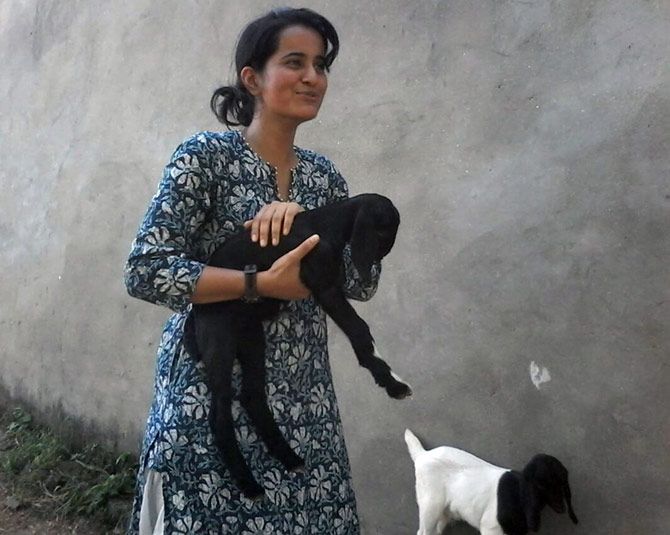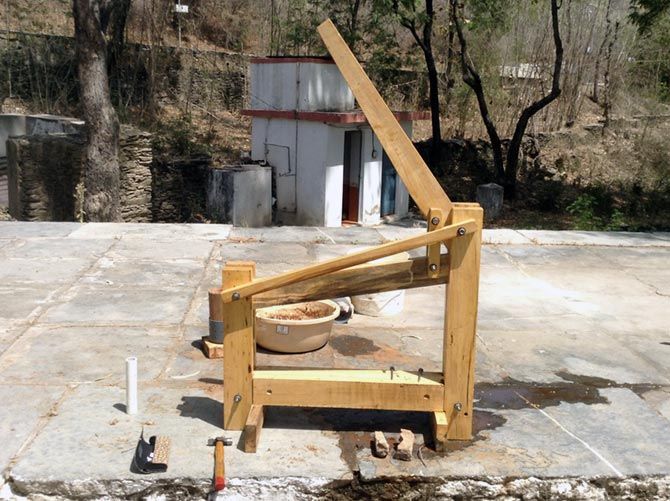India is witnessing a radical transformation where highly qualified youngsters are giving up cushy jobs to make a difference in the lives of people in rural India.
Manu A B/Rediff.com tracks the success stories of some of the brightest people who are living in remote villages to change the profile of rural India.
Part 1: IIM grad Shuvajit Payne gave up a cushy job to work in rural India
Part 2: A young man's crusade to light up a remote Odisha village

Nupur Ghuliani gave up a lucrative career to work in rural India. Making a cheaper and environment friendly alternative to firewood from waste materials is now her only mission.
Like many city-bred youngsters, 22-year-old Nupur Ghuliani had never visited a village. A western rock singer, Nupur was one of the most popular students in her college.
Interestingly, she is all set to get a ‘rock star’ status not for singing but for her commendable work in the rural villages miles away from Delhi, the city she hails from.
After her graduation in commerce, Nupur wanted to become a chartered accountant. She cleared the first part of CA inter examination and joined Ernst and Young for an internship. Everything was in place just like any youngster of her age would aspire for.

She worked for a year doing her articleship but all along, she was more fascinated by social entrepreneurship and rural development projects. After 5 months of deliberations, Nupur made up her mind to join the social sector.
She bid farewell to a lucrative profession and charted her way to the hinterlands of India and to make a difference in the lives of the poor.
Both her parents - her father who is a doctor in the Indian Army, and her mother supported the decision.
“As I was looking for the right platform to start working, I came to know about SBI’s Youth for India Fellowship. It was the best opportunity for me to discover the real India and understand the problems people face in rural areas” says an optimistic Nupur.
SBI Youth for India is a 13-month programme that gives a good opportunity to youngsters to work on rural development projects.
Being her first visit to a village ever, each moment was a learning experience for Nupur. The warmth and friendliness of the villagers were touching. It was a totally new world for her, a world she never knew could exist.
While travelling by a state transport bus, Nupur got new insights about people living in rural areas. Living in Delhi, she was always cautious about the glares and stares she got in public places. And here far away from home, when she saw a man staring at her in the bus, she was anticipating some kind of trouble but he got up and offered his seat, much to her surprise.

“I had to give up all my pre-conceived notions and start off on a fresh note. Being a part of the NGO Seva Mandir also helped. I received so much love and respect from the villagers that it made my resolve to work for them even stronger,” says Nupur.
The initial days were tough for Nupur as she had to get adjusted with just basic facilities.
“I fell home sick. I led a nomadic existence and I knew taking a rural fellowship would mean giving up luxuries. I am glad that these experiences had a therapeutic effect on me,” says Nupur who is now confident to take on big challenges.
Nupur opted to work on the alternative energy project in the Kherwada block in Rajasthan. Here, 18,000 houses use only firewood like thousands of other villages in India who don’t have access to any alternative fuel.
The struggle to get wood is a major issue in these villages.
“It was disheartening to see the drudgery of women who collect and carry 30 kgs of firewood everyday to their houses. They do this for a month. I met an old couple who used 10 kgs of wood a day. People in the Kherwada block use 3.21 tonnes of wood every year. Besides the environmental loss, it also causes several respiratory diseases. Indoor smoke is a silent killer as it takes the life of around 2 million people across the world every year,” explains Nupur.
An alternative fuel was imperative to bring an end to this colossal loss to the environment. Majority of the women are unaware of the health hazards.

After 7 months of intensive research and experiments, Nupur was able to successfully build a prototype of a biomass briquette, an alternative fuel from waste materials in the village.
Biomass briquettes are basically densified biomass structures, which can be used as an alternative to firewood. These are extensively used by rural and industrial communities all over the world.
These can be made of anything from a wide spectrum of materials – simple organic agro-reside and 100 per cent pre-processed materials like charcoal fines, sawdust etc.
Briquetting offers a wide variety of choices - wet and dry briquetting and charcoal and non-charcoal briquetting.
The method used to press briquettes are highly variable and are totally dependent on the environment where they need to be produced.
“I am currently exploring non-charcoal dry briquetting. It's a mechanical process and labour intensive. The idea is to use methods which are close to the way the villagers function. For this purpose I am using decomposed leaves and sawdust as my two primary inputs and tamarind seeds and water as binders. My briquette mixture consists the above in the ratio of 3:0.5:0.5:3 for a batch of 3 briquettes. The performance of my briquettes will be testified through a scientific analysis which is due by the end of the month. It is for the first time that a biomass briquette of this type has been build and tested in India.”

In the next 5 months, I am confident of using briquettes in the villages. I am looking for entrepreneurs who can join hands with the village community to produce the product cost effectively on a large scale,” points out Nupur.
Villagers were curious to know more about her work. They would gather around her, observe the process and appreciate her efforts when she used to collect waste materials all by herself and get the mixing and pressing work done. Once the product is tested and mass produced, it can be used in villages across India.
Nupur’s work is a testimony that - age, gender, educational qualification or urban upbringing – nothing can stop one from helping people. All one requires is the willingness to work hard and have an open mind to take up challenges to help millions of people who need help.
“The last 7 months have taught me more than what I learnt in the last 4 years. Going back to a corporate job probably cannot give me the satisfaction that I get now. After taking up the fellowship, I realised that we can live without a television, AC or any other material luxuries. I want to do well by doing good,” says Nupur.

Though a majority of our villages are cut off from development, Nupur believes there are more initiatives now to bridge the rural-urban divide.
“It is encouraging to see many youngsters and NGOs working in several rural development projects. We need a lot of innovation at the rural areas. We need indianisation of solutions to meet local needs. There is no eco system to support programs at grassroot level. Our development strategy should be customised to cater to a diverse group of people. It is unfair to impose common solutions across all states. The needs and demand differs from one state to another. Most of the money never reaches the last mile as a result a majority are left out from development,” Nupur says highlighting the need to have a proactive development oriented government policy.
After learning about her work from an article, her mail box was flooded with congratulatory mails. Many engineers across India wanted to know if they could help her in any way.
“Even software engineers wanted to chip in even though my project is a small mechanical engineering exercise. I am overwhelmed by the support and I hope to continue doing concrete work on different forms of alternative energy even after the SBI Fellowship is in about 3 and a half months” explains Nupur.
To know more about Nupur’s work, you can mail her at ghuliani.nupur@gmail.com
If you wish to join the movement to bring about a change in rural India or would like to contribute in any way, you can send a mail to shuvajit@youthforindia.org










